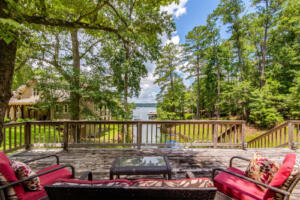- Inferior Photos: Unflattering, unrealistic, and a lack of photos of your lake home can turn buyers away from the property.
- Unresponsive Listing Agent: An agent that isn’t reliable or responsive to interested buyers will cause you to lose out on potential deals.
- Aspirational Price: Although this is a hot real estate market, it’s important to list your hope at a reasonable price. Most buyers won’t show interest in a home that’s grossly overpriced.
Tag: lake real estate agent
Whiteboard Topics: Buyer’s Agent Services Are Not Free
Have you ever had an agent tell you that they can help you buy a home or property and not cost you anything? In this video, Lake Homes Realty’s CEO, Glenn S. Phillips, explains why this is not true.
- Department of Justice (Nov. 19, 2020). The National Association of Realtors and the Department of Justice had a settlement that states agents can no longer claim that their services are free.
- Paid through Cooperative Agreements. Even though the agents are not being paid for their services, they are being paid through the deal or transaction via the brokerage and listing agent.
- Bring Value. The buyer’s agent you’re working with should be looking out for your best interest…someone who pays for themselves in the value that they bring.
For more articles and industry tips, be sure to visit our blog.
Whiteboard Topics: Predicting the Fall Real Estate Market
If you’re preparing to sell your lake home, it’s natural to wonder how the market will be doing this Fall. Although COVID-19 has left the market’s future more uncertain, some reliable predictions still exist. Lake Homes CEO, Glenn Phillips, shares five things to consider when predicting the Fall real estate market:
- Stimulus checks, the PPP program, and other initiatives have created an artificial economy that will likely continue through the Fall
- A high demand for lake houses has persisted throughout the pandemic
- Despite the demand, there’s a housing shortage of appropriately priced inventory for lake homes
- Consumers’ fear of uncertainty means they are not willing to overpay for homes
- As stimulus money fades later in the year, an economic cliff is likely to happen when the true state of our economy becomes clearer.
If you’re buying or selling a lake home, it’s important to keep these Fall real estate market predictions in mind. As a national specialist in lake real estate, we’re here to help. Check out our website for more information.
Whiteboard Topics: Six Reasons You Don’t Need a Physical Office
If you’re looking to buy or sell a lake house, you may wonder if it’s necessary to pick an agent with a physical office. Contrary to popular belief, brick and mortar isn’t necessary to sell a home. Lake Homes Realty CEO, Glenn Phillips, gives 6 reasons why your lake agent doesn’t need an in-person office.
- The office isn’t relevant in a digital world
- Time is precious, and office meetings take time from viewings
- Many top producing agents work more effectively without a physical office
- Offices don’t sell houses — agents and brokers do
- Buyers enjoy the convenience of an online platform
- Money spent on office leases could be spent helping clients
Just because an office environment is familiar doesn’t mean it’s the future of real estate. The best agents can do their work anywhere. Find an agent today at Lakehomes.com to have your questions answered.
Whiteboard Topics: Three Questions to Ask Your Real Estate Agent
Lake Homes Realty CEO, Glenn S. Phillips, reveals two unspoken real estate secrets– not all real estate agents are equally skilled, and many use the same formula when listing a home. With a special property like a lake house, how do you determine which agents can successfully sell your home?
Glenn recommends interviewing potential agents and asking three questions: What else will you do to sell my home? Who do you know? and Can you name 15 areas where people are shopping at my lake? The best lake home agents will feature your property on highly-targeted websites, have connections with multiple lake-focused agents, and have expertise in several lake areas.
Get Schooled on These Common Lake Real Estate Terms

Lake real estate transactions can be confusing, especially if you are unfamiliar with the terminology most often associated with the process.
At Lake Homes Realty/LakeHomes.com, we are committed to providing you with all the tools you’ll need to ensure your lake home buying or selling experience is both convenient and straightforward.
In tandem with our buyer-focused articles on the questions to ask before you buy and the many options for buying lake property, this guide to common lake real estate terms is an excellent tool for preparing you for a successful lake home shopping experience.
Dockable Lakefront: Properties with “dockable lakefront” are properties where no dock currently exists, but the land has a permit for future construction of one.
Seasonal Full-Pool: Some lakes, specifically those managed by power companies and the Army Corps of Engineers, experience scheduled water level drawdowns for flood control, shoreline protection, and invasive species control purposes. Lakes are usually at their lowest in the winter months.
Short-term Rental Restrictions: Not all lakes welcome weekend renters. Before buying a lake home with intentions of using it as a hotspot for summer vacationers, check with your agent about any short-term rental restrictions that may apply in your market.
Bulkhead: Usually made of wood, stone, steel or concrete, bulkheads are barriers or retaining walls around your lake property’s shoreline. These structures help protect against shoreline erosion, flooding, and poor drainage, as well as help to maintain water depth.
Rip Rap Seawall: Similar to a bulkhead, a rip rap seawall is a barrier between your lake home’s shoreline and the water created using rocks, stones, and other natural materials.
Grandfathered Dock/Boat House: On lakes suffering from overdevelopment, restrictions may be applied to prevent further damage to the lake’s shoreline stability. On Lake Lanier, for example, docks can no longer be constructed. If the home you are interested in buying has a dock or boathouse on the property, it might be “grandfathered in,” meaning so long as it existed before the restriction passed, it can stay.
Leased Lots: When buying a lake home, you may only be buying the physical house itself, apart of the land on which it sits. Instead, the land is owned by the entity that owns the lake and is leased to homeowners.
Deeded Lots: The opposite of a leased lot, deeded properties are those where you own the rights of use.
Corps Line: On Army Corps of Engineers lakes, the Corps line marks a variance between the lake’s shoreline and the purchased property that remains in the ownership and control of the Corps.
Though not an exhaustive list by any means, these common lake real estate terms are among the most frequently asked about in the industry.
For more insight on lake real estate terminology, get in touch with your local lake expert agent.
Enjoy trivia? Be sure to join our newsletter for weekly article updates! SIGN UP
Client Spotlight: How LakeHomes.com Helps Buyers Find Lake Homes
When Amy Knight-Roberts and her husband Lindsey put their Walnut Hill, Florida, farm on the market, they were unsure of where their next move would take them.

“We looked at a lot of different places, all over,” Knight-Roberts remembered. “We knew we wanted to go somewhere, we just didn’t know where.”
In 2017, after 12 years of searching, the retired veterinarians finally found what they were looking for: a home on Lake Martin.
“I was tired of hurricanes, and tired of the high insurance payments,” explained Knight-Roberts about what sparked the couple’s interest in selling their home of 20 years. “We were ready to downsize. I love the beach, but I can always just rent a beach house.”
The Search
Like many modern buyers, the couple took to the web in to begin their search for lake property.
There are countless online listing sites available to buyers today, all of which compile a wide variety of listings from MLSs across the U. S. to present an all-encompassing view of an area’s real estate, including both multi-tenant and single-family homes.
For those looking specifically for lake property, the biggest player online is Birmingham-based LakeHomes.com, the nation’s largest lake-focused real estate company. Unlike other listing sites, it uses proprietary algorithms to filter out off-lake properties to provide the most comprehensive database of lake listings available.
Knight-Roberts and her husband viewed hundreds of active listings across east-central Alabama’s Lake Mitchell, Lay Lake and Lake Martin, comparing water depths, miles of shoreline, fishing and boating regulations, and various amenities.
“Our friends bought a house on Lake Martin the year before, and we wanted to be able to spend more time with them,” said Knight-Roberts. “Lake Martin also brings us closer to family; my sister lives on Lake Mitchell, and my father lives on Lay Lake.”
The couple searched through pages of online listings to narrow down where exactly they wanted to buy, noting the convenience of being able to view hundreds of homes via the web.
“The listings told us everything we needed to know,” Knight-Roberts said. “There were adequate pictures, and we could see all the different angles of the lakes.”
As a result, the couple was able to rule out Lay Lake and Lake Mitchell, ultimately deciding Lake Martin best suited their aesthetic needs and offered more choices of level lots, a crucial detail for the aging couple.
In addition to the convenience online home shopping provided them, filtering options also benefited the buyers by allowing them to further refine their search results by location and price range.
“We started looking at homes for around $450,000, but most of the houses were fixer-uppers or out of the way [of town],” Knight-Roberts explained.
According to the LakeHomes.com 2018 Winter Lake Market Report, the average home price on Lake Martin is about $580,000 at the time, a little more than $100,000 over the couple’s original budget.
“We ended up looking in the $600,000 range, and we began to see places we were more comfortable with,” said Knight-Roberts.
The Agent
After redefining their budget and choosing the lake on which they would buy, the couple needed to connect with an agent with expert experience selling lake real estate.
Again, the couple turned to the web, where they were connected with Lake Home Realty’s Angela Van Houten, whose expertise made the buying process, as Knight-Roberts deemed it, “an overall pretty great experience.”
“She was nice, and organized, very proactive and with us through each step,” Knight-Roberts said. “Everything just flowed. It was all unusually easy.”
Within three months, the couple made an offer on a home only two houses down from their friends’. Thirty days later, the lake home was theirs.
The Tools
Roger and Bonnie Spear, an architect and retired UAB professor from Birmingham, turned to the internet’s vast inventory of homes two years ago, idly looking for a possible vacation home close to family and their alma mater.
“We had wanted a lake house for many years, and of course it had to be next to Auburn,” recalled Bonnie Spear. “We wanted to go to a place with an infrastructure that was close to amenities, and we kept coming across Lake Martin.”
The couple utilized online map tools, like the one featured on LakeHomes.com, to see how close homes were to the water, how far the bodies of water were from the nearest towns and, perhaps more important to them, how close they were to Auburn.
“The map showed all the different areas of the lake, which allowed us to narrow down the areas we were most interested in,” Spear said. “We ruled out Lake Mitchell and Yates Lake because they just weren’t as developed as Martin.”
Shopping online also allowed the Spears to virtually tour homes on Lake Martin from the convenience of their Birmingham residence. The more comprehensive the database of listings, the more specific the pair could be in their search.
“I had three criteria when we were looking for a house,” Spear explained. “I wanted a beautiful view, very few steps down to the water, and I wanted a screened-in porch, or at least the space to build one.”
Spear noted listing photos allowed she and her husband to see homes they liked from different angles and the views of the lake from different rooms, as well as helped to show how far each property was from the water.
As a result, the couple was able to rule out a number of homes without ever actually visiting them.
Local Expertise
Spear commented that working with an agent who knew the lake was “invaluable.”
“Our agent listened to what we wanted, showed us only homes that fit our criteria, and she knew important details about the lake we would have had no other way of knowing if it hadn’t been for her,” Spear said.
Over the course of nine months of active shopping, the couple visited Lake Martin eight times and physically visited barely more than a dozen homes.
They quickly fell in love with one of the first homes they visited, but negotiations on their offer fell through. Ironically, eight months after their first visit, the Spears got a second chance at buying the property.
This time, their offer was accepted.
Six weeks later, years after first searching for property online, Spear and her husband were lake home owners.
“Look a lot and do your research,” Spear advises others who are in the market for a lake home.
How My Lake Home Broke Zillow’s Zestimate
Congratulations Realtor, you’ve won my listing!
I loved everything about your presentation, from the analytics you showed me to your proven track record at selling lake homes. In fact, I only had one problem, and it was a big one: your suggested list price was vastly different from what I thought my property was worth.
You said we should list at one price, but Zillow told me a different story.
Since I got the information from a popular accredited source, I was sure it must have been true. But I am so glad you took the time to explained to me how the site’s home valuation tool worked and for showing me how my lake home broke Zillow’s Zestimate.

For starters, I knew the tool used physical attributes — like my home’s square footage and our lot size — to help determine its value. I also knew that public tax information was taken into account.
What I didn’t know was that public information and user-submitted data were factored in, too.
I thought this information could be helpful, and to your point, it could be.
But after discussing how much I thought my home was worth based on my years of living there, you made a great point by suggesting my emotional attachment to my lake home could cause me to draw some biased conclusions about how much it was actually worth.
However, I was sure that past sales records of the homes in my neighborhood and nearby “comparable homes” were solid data points.
Thank you for taking the time to help me understand how many of these records and tools used by Zillow often don’t apply in niche markets (like lake real estate).
The Zestimate was not designed for unique properties and unique markets.
One thing that stuck with me is how you said Zillow has never been in my lake home, nor any of the homes mine is being compared to.
Zillow couldn’t possibly account for the upgrades we made to the kitchen a few years ago, nor could the Zestimate tool put an appropriate value on how pristine our view of the waterfront is!
And, those “comparable” homes being used to determine the value of my home?
Well Zillow certainly couldn’t know that our dock was 10 years newer than the dock next door, or that even though our properties are located right next to one another, our neighbors have an obstructed view of the lake, thanks to a patch of endangered trees running through their backyard.
As someone who loves to see the data, I also appreciated you showing me Zillow’s Accuracy Rating report, which I now have a copy of thanks to you!
Since we live on Smith Mountain Lake, you pulled up our county (Franklin County, Virginia), and we saw that the area had a Zillow Accuracy Rating was a “2”.
Of course, I took that to mean we had the second-best accuracy rating, but then you explained being number two wasn’t necessarily a good thing.
What having a “2” rating really meant was that Zillow’s Zestimate was considered “fair” rather than good or best. What it further meant was only 63 percent of Zestimates fell within 10 percent of the actual sales price.
That meant more than a THIRD of Zestimates here were off by more than 10 percent!
Then you explained the Zillow median error rate in a way I could relate to easily: I imaged all the homes on our street as if they were in a single room, lined up in order from most accurate to least accurate Zestimate.
If the median error rate were 7 percent, the middle home would sell for anywhere from $465,000 to $535,000, a range of $70,000.
That’s quite a difference.
Fortunately, you were sure not to pick on Zillow exclusively, but instead you showed me the valuations from several sites, so I could see how widely the estimates varied.
It was icing on the cake to learn that in 2016 Zillow’s CEO sold his home for 40 percent less than its Zestimate.
I don’t think I understood exactly how important it was to work with a lake real estate agent until that moment.
I had spoken with two other agents already, but unlike you, neither lived, worked and played in our lake market.
Only you were actually a lake resident, had been in many of the houses for sale around us, and were prepared with a ton of local data that the others couldn’t provide.
I also appreciated that you didn’t scold me for trusting the Zestimate. You kindly explained that Zillow was a great place to start and that my homework was not in vain.
That’s how I knew to trust you and how I knew choosing to work with you was the right choice.
I knew you would appropriately price our lake home according to our market, not based on some figure determined by a computer.
You are a true lake expert, and I am looking forward to working with you!
Sincerely,
Your New Forever Client
When’s The Best Time of Year to Buy a Lake Home?
Ask your lake real estate agent when the best time to buy a lake home is, and they will gladly tell you, “it’s always a good time to buy lake property!”
And believe it or not, what your agent is saying is true. There are pros to buying in both the peak and off-seasons, just as there are cons to both periods as well.
So is there a right or wrong time to buy a lake home? Well, we’ll let you decide.
Peak Season
Pros:
Lake real estate markets start livening up in the spring, as temperatures begin to climb, and are in full swing by summer.

Today’s sellers know that summer months see more potential buyers in their markets than any other time of year.
Because of this influx of potential buyers, spring and summer markets are suddenly inundated with homes for sale.
This spike in inventory is a considerable part of why buying in the peak season is preferred by many prospective buyers.
Spring and summer not only yield a more robust variety of properties to choose from, but the lake season also presents buyers with a wider price range, thus a better chance of finding the RIGHT lake home.
Another pro to peak season-shopping is that buyers often have fuller pockets during this time of year. Tax returns have been processed and holiday bills settled, therefore many have more money for down payments.
Cons:
That said, demand is greater in warmer months, which means higher competition for both buyers AND sellers.
Sellers compete with other homeowners to get their homes sold quickly and for top dollar, and buyers compete with each other to win out on their favorite listings – without going too much over budget.
This two-edged sword means that with a seemingly endless supply of buyers, sellers have the luxury of fielding as many offers as they choose until one comes along that matches their expectations.
This also means that buyers are more likely to put multiple offers down at one time so as not to miss out on other opportunities.
Additionally, because sellers are aware that demand is greater during the lake season, they often list their homes at higher prices than they would in the off-season. This is because in a high-competition market, buyers are likely more willing to pay a little extra for the right lake home.
Off-Season
Pros:
In the lake real estate off-lake season, generally during the fall and winter, many sellers opt to take their homes off the market to relist them as new listings in the spring.
But those homeowners who choose to keep their properties on the market past peak season are often exhausted and ready.to.sell.
As a result, home prices typically drop, which is great for budget-conscious buyers. Plus, tired sellers are likely to advocate for a quick closing.
Not only does off-season shopping allow buyers to spend more time inspecting the home, area and lake culture outside the busy season, but it can also mean fewer offers for sellers to consider.
Purchasing a lake home in the fall or winter also gives buyers plenty of time to prep the property for the coming lake season.
Cons:
Of course, in the off-season there are fewer listings for buyers to consider as demand tapers down. Tighter inventories can mean bigger compromises in property features and distance from the waterfront.
Finding the time to tour homes can also be more difficult for off-season buyers because of the holidays when parties and weekend guests are more frequent.
Winter weather may factor into off-season buying, as well.
Not only are lake levels generally lower during colder months, the wildlife has also disappeared and the plants have all died, making it difficult for buyers to envision themselves enjoying sunnier times there.
Particularly in harsher environments, buyers may have to suffer touring though unheated vacation homes in inclement conditions, if the weather doesn’t prevent them from traveling there all together.
Want to chime in on when YOU think the best time to buy a lake home is? Let us know in the comments below!
And, if you have more questions about lake real estate buying or selling, check out our other articles, “The Hidden Costs of Buying a Lake Home” and “Lakefront Property: What Are Your Options When Buying at the Lake?“









